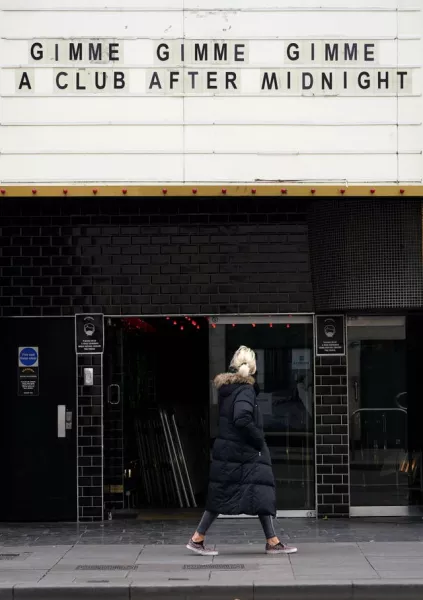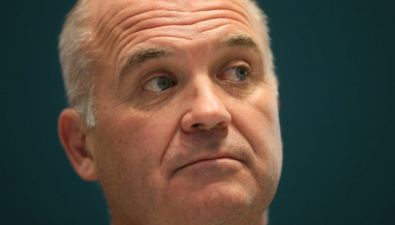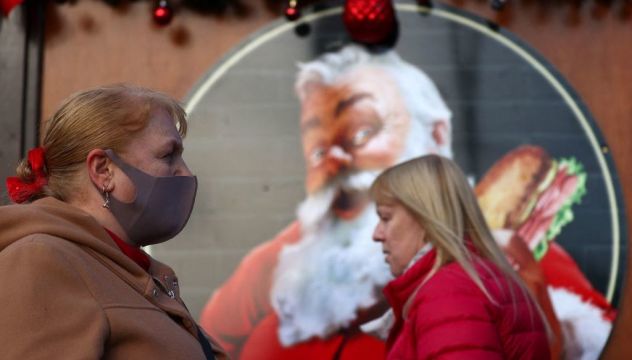The number of Covid-19 cases could surge to 15,000 a day after Christmas if the Omicron variant becomes dominant, health experts have warned.
The National Public Health Emergency Team (Nphet) said that the new variant could drive up cases during increased social activity over the Christmas period.
It comes as a further 5,419 cases were confirmed in the Republic on Friday. Some 528 patients were in hospital with the disease on Friday morning, including 110 in intensive care units.
In a letter to the Government, Nphet said that higher levels of socialising combined with the impact of Omicron could pose a “very real but as yet unquantifiable risk” to the management of Covid-19 over the coming weeks.
Health officials warned Ministers that this presents “serious challenges” in the weeks ahead, adding that it is “impossible” to quantify the level of risk and its impact.
Chief medical officer Dr Tony Holohan has urged the Government to close all nightclubs, and bring in restrictions that were in place during the summer.
This includes returning to table service only in hospitality, a maximum of six people allowed per table, no multiple table bookings and no mingling between tables.
Dr Holohan has also advised the Government to limit indoor capacity to 50 per cent for all cultural, entertainment and sporting events.
They have also urged the Government to bring in the Covid pass for gyms and hotels. Other measures include limiting private gatherings to three households.
Dr Holohan said that if social contact can be maintained at current levels or marginally decreased, the level of infections per day will remain below 5,000.
However, if social contact increases to levels seen in December last year, cases could surge to between 6,000 and 8,000 cases per day in early January.
If infection-induced immunity is low or evaded by the new variant, a “very large surge is possible”, peaking at 8,000 to 15,000 cases per day, Nphet added.
In a pessimistic but “plausible scenario”, Nphet said that between 750 to 1,300 people could need hospital care and up to 400 people would require critical care.
Government has been warned that if Omicron becomes dominant over the coming weeks and has moderate reductions in vaccine effectiveness, the risk of a surge in cases is “high to very high”.

The Cabinet is assessing the advice and whether to bring in new Covid restrictions ahead of Christmas.
Concern has been expressed in recent days that despite coronavirus infections stabilising, numbers remain too high.
The Cabinet meeting comes following a meeting of the Covid-19 sub-committee on Friday.
Taoiseach Micheál Martin and Minister for Public Expenditure Michael McGrath met representatives from the hospitality industry on Friday.
It is understood that representatives urged the Government to provide the necessary supports to struggling sectors and asked for a long-time plan amid ongoing uncertainty about the next stages of the pandemic.
Travel testing rules
Earlier, it emerged the introduction of new testing rules for arrivals into Ireland, introduced in response to the Omicron variant, have been delayed by 48 hours.
PA understands that industry figures were informed on Thursday that the rules will now come into effect on Sunday.
Earlier this week, the Government agreed new rules on travel that would see all travellers entering Ireland required to show a negative result on a professionally-administered antigen test 48 hours before arrival, or on a PCR test 72 hours before arrival.
The changes to the rules, which also apply to travellers from Britain, come as the Omicron variant continues to cause concern worldwide.
Ireland has so far confirmed one case of the new variant.
Minister for Justice Helen McEntee said that the new testing regime, due to begin on Friday, had been postponed.
Ms McEntee also said she expected Cabinet to make a decision on Friday evening on whether restrictions will be brought in.
She said that Ireland was a “very different place” to last year, but that the case numbers are still at a concerning level.

“Nobody was vaccinated this time last year. Over 93 per cent of our population has two shots and over 900,000 people now have a third booster,” she said.
“At the same time, even with all that work, numbers are still high. They are not coming down as quickly as we would like and that’s why the recommendations I think have been made.
“But I think people can be reassured that as we roll out the booster programme, as people continue to be vaccinated, that is going to have a huge impact on what we can and can’t do over the next couple of weeks and months.”







